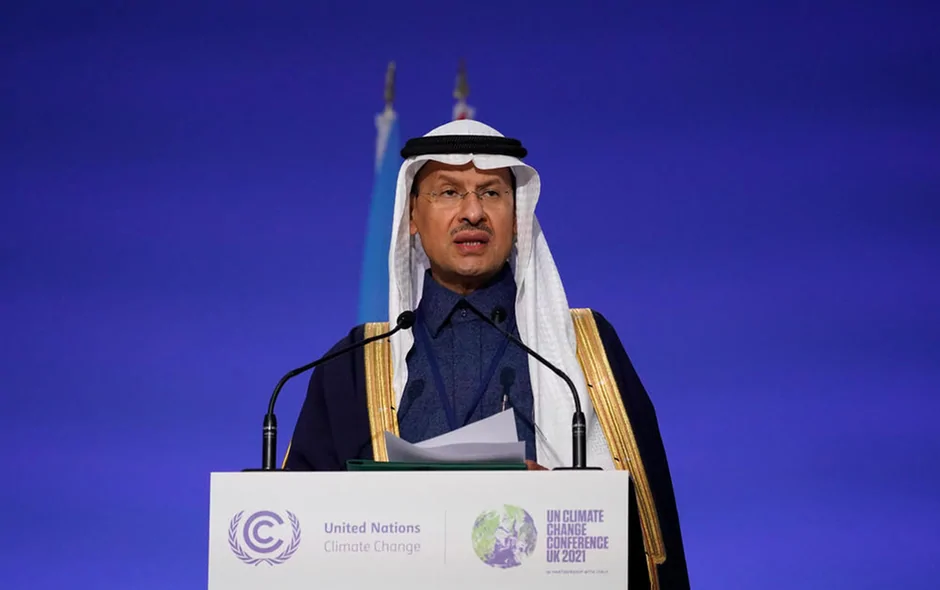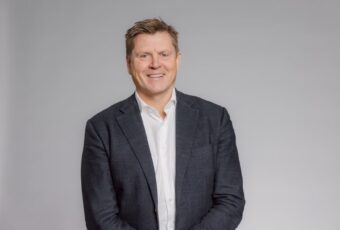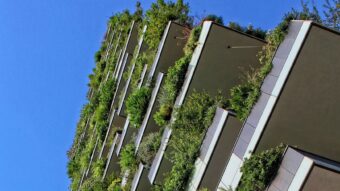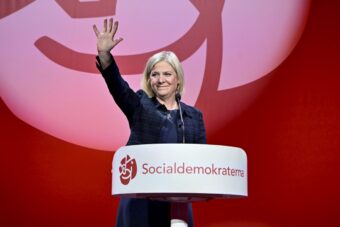
GLASGOW, Scotland (AP) — The tightest of smiles on his face and the fabric of his traditional thobe swirling about him as he strides through a hal“What you have been hearing is a false allegation and a cheat and a lie,” Prince Abdulaziz bin Salman al Saud said this week at the talks in Glasgow, Scotland, according to Associated Press.
He was responding to journalists pressing for a response to claims that Saudi Arabia’s negotiators have been working to block climate measures that would threaten demand for oil.lway at U.N. climate talks, Saudi Arabia’s energy minister expresses shock at repeated complaints that the world’s largest oil producer is working behind the scenes to sabotage negotiations.
“What you have been hearing is a false allegation and a cheat and a lie,” Prince Abdulaziz bin Salman al Saud said this week at the talks in Glasgow, Scotland. He was responding to journalists pressing for a response to claims that Saudi Arabia’s negotiators have been working to block climate measures that would threaten demand for oil.
“We have been working well” with the head of the U.N. climate talks and others, Prince Abdulaziz said. Negotiators from about 200 countries are coming up against a weekend deadline to find consensus on next steps to cut the world’s fossil fuel emissions and otherwise combat climate change.
Saudi Arabia’s participation in climate talks itself can seem incongruous — a kingdom that has become wealthy and powerful because of oil involved in negotiations where a core issue is reducing consumption of oil and other fossil fuels. While pledging to join emission-cutting efforts at home, Saudi leaders have made clear they intend to pump and sell their oil as long as demand lasts.
Saudi Arabia’s team in Glasgow has introduced proposals ranging from a call to quit negotiations — they often stretch into early morning hours — at 6 p.m. every day to what climate negotiation veterans allege are complex efforts to play country factions against one another with the aim of blocking agreement on tough steps to wrench the world away from coal, gas and oil.
That is the “Saudis’ proposal, by the way.
hey’re like, ‘Let’s just not work at nights and just accept that this is not going to be ambitious’” when it comes to fast cuts in fossil fuel pollution that is wrecking the climate, said Jennifer Tollmann, an analyst at E3G, a European climate think tank.
And then “if other countries want to agree with Saudi, they can blame Saudi Arabia,” Tollmann said. Mary Robinson, former president of Ireland and head of a group of senior political leaders on climate, choked up as she told Sky News that Saudi Arabia was playing “dirty games” and seeking to gut crucial, consensus-building parts of draft agreements out of the talks.
Saudi Arabia long has been accused of playing a spoiler in the climate talks, and this year it is the main country singled out so far by negotiators, speaking privately, and observers, speaking publicly. Russia and Australia are also lumped in with Saudi Arabia at the talks as countries that see their futures as dependent on coal, natural gas or oil and as working for a Glasgow climate deal that doesn’t threaten that.
Despite efforts to diversify the economy, oil accounts for more than half of Saudi Arabia’s revenue, keeping the kingdom and royal family afloat and stable. About half of Saudi employees still work for the public sector, their salary paid in large part by oil.
And there’s China, whose dependence on coal makes it the world’s current biggest climate polluter. It argues it can’t switch to cleaner energy as fast as the West says it must, although the United States and China did jointly pledge to speed up their efforts to cut emissions, reports Associated Press from Glasagow.
UN Climate Change News, 10 November 2021 – The sustainable management and conservation of the world’s forests has been significantly boosted at COP26 with financial pledges, technical progress and a declaration by World Leaders and other stakeholders on ‘Forests and Land Use’. Realising that action is needed now to preserve forests’ crucial role in contributing to resilience-building, emission reductions and local livelihoods, this article provides an overview of progress achieved.




